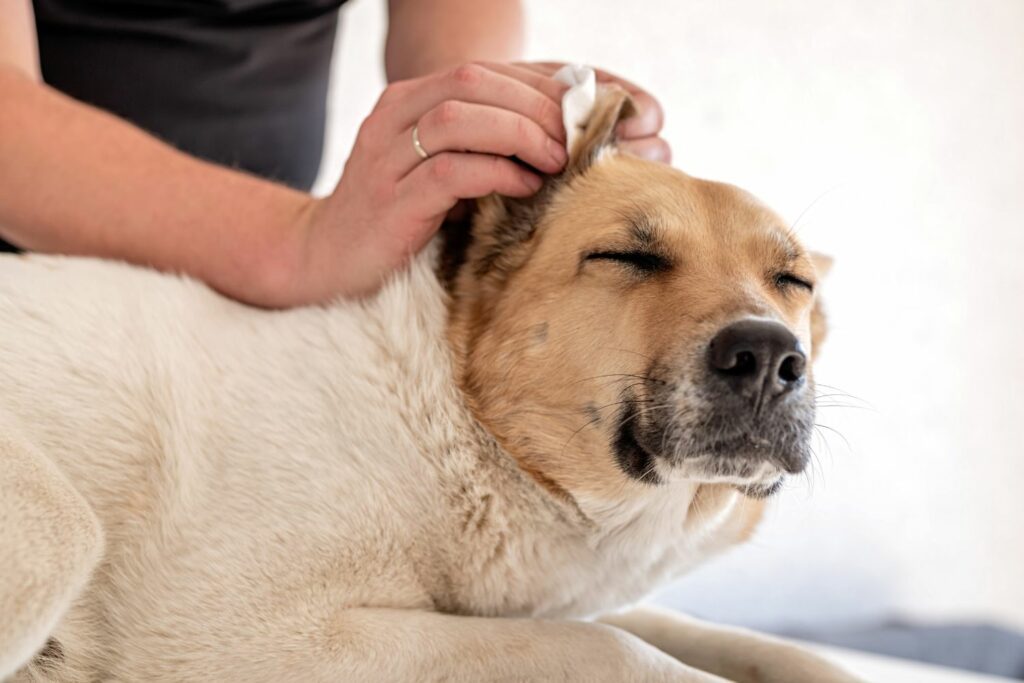Home remedies for dogs with itchy ears [2025 Update]
 Cecilie Hemsen Berg
Cecilie Hemsen Berg
It’s a quiet evening, and you’re lounging with your furry friends on the couch. Suddenly, you notice your dog scratching its ears persistently and looking in some distress. Sound familiar? Many dog owners have faced this situation. While itchy dog ears can be a sign of various underlying issues, there are several home remedies that might offer relief. This article dives deep into the potential causes of itchy ears, effective home treatments, and preventive measures to ensure your dog stays comfortable and happy.
If your dog’s itchy ears are a chronic condition, you should contact your veterinarian to determine the cause of ear itching.

Potential Causes of Itchy Ears
Dogs, with their keen sense of hearing, have a unique ear structure. Their long, L-shaped ear canals are adept at trapping sound waves, but unfortunately, they also trap dirt and moisture easily. And if you’ve ever wondered, “Why are my dog’s ears so itchy?” you’re not alone. Let’s explore some common culprits:
Ear Mites
These tiny parasites are a common cause of itchy dog ears. They thrive in the warm, dark environment of the dog’s ear canal. An infestation can lead to inflammation and a dark, waxy discharge. If you notice your dog shaking its head frequently or see a coffee-ground-like substance in its ears, ear mites might be the cause.
Bacteria & Virus
Just like humans, dogs can also suffer from bacterial and viral infections in their ears. These infections can lead to redness, swelling, and a foul odour. Regular cleaning can help prevent bacterial infections, but once they set in, it’s essential to seek treatment as chronic ear infections will be very unpleasant for your pup.
Yeast Infection
A common offender for “itchy dog ears home remedies” searches. Yeast infections in a dog’s ears usually result from an imbalance in the ear’s natural flora. Symptoms include a smelly discharge, redness, and constant scratching.

Allergies
Dogs, like humans, can be allergic to certain foods, pollens, or even household products. These allergies can manifest as itchy and inflamed ears. Identifying and eliminating the allergen is crucial for relief.
Foreign Objects
Dogs are curious creatures. Whether it’s a seed, twig, or just some dirt, foreign objects in the ear can cause significant discomfort. Regular checks can help spot and remove these intruders before they become a problem.
Diseases
Conditions like hypothyroidism can manifest as itchy ears in dogs. If you’ve tried multiple other remedies for an itchy ear and nothing seems to work, it might be time to consult with a vet to rule out underlying diseases.
Home treatment for itchy ears
It’s advisable to consult a veterinarian before initiating any home treatment for your dog’s itchy ears. However, you can take several proactive measures at home to prevent itchiness and other ear-related issues. It’s beneficial to familiarize yourself with your dog’s ears’ normal appearance and odor early on. This way, you can easily identify changes in earwax consistency or unusual odours.

- Be sure to keep your dog’s ears clean and dry. A few drops of olive oil can help loosen earwax. Use a small pipette and carefully drip a few drops of the oil into the ear. Rub the ear gently and let the oil work for 30 minutes before gently wiping around the ear canal with a clean cotton ball (it is important not to use an earbud). You can also buy ear cleaning drops for dogs at your local.
- If you see that the dog’s ear has a lot of dirt in it, you can gently wash the ear with a cotton ball (it is important not to use an earbud). Dip the cotton ball into a cup of lukewarm tea made from chamomile, thyme or marigold. Alternatively, add a few drops of apple cider vinegar to lukewarm water, moisten a cotton ball with the mixture and gently wash the ear canal. Do not use Q-Tips/earbuds as it only helps to push earwax and dirt further in, and aggravates the symptoms.
- Give your dog high-quality, allergy-friendly food. Omega 3, such as that found in Nala Health dog food, can be a useful dietary supplement for, among other things, skin.
- Regular trimming of your dog’s claws will prevent potential damage to the skin inside the ears when your dog scratches due to itchiness.
Prevent your dog from getting itchy ears
Taxi was our first family dog; a lovely little English cocker spaniel. He, unfortunately, had some severe ear infections and problems, and we had many visits to the vet to sort it out. He absolutely loved swimming, whether in the ocean or a lake. Eventually, we learned how to minimize the infections. These are some of the remedies for dog ear scratching that he taught us:

- Keep the ear canals clean and dry (you can use olive oil or an ear cleansing ointment from the vet). If your dog enjoys swimming, dry the ears with a towel to prevent too much moisture in the ear canal.
- Trim the fur inside and around the ear canal as well as the fur on the ears regularly so that the ear canal gets air.
- If the skin in the ear is dry, you can use a perfume-free balm made from natural oils or coconut oil. Our recipe for homemade paw balm is excellent for dry ears as well.
When to contact the vet
If the itchy ear cannot be treated with home remedies, a veterinarian must examine the dog to check for ear infections, allergies, and parasites. The veterinarian can then prescribe the correct medication or treatment. They will also be able to see if there is something lodged in the ear that could cause discomfort. The following symptoms require a check-up from your vet as well:
- Persistent Scratching: If your dog’s scratching doesn’t subside after trying multiple remedies, it clearly indicates that a deeper issue might be at play.
- Foul Odor: A strong, unpleasant smell from the ears can indicate a severe infection.
- Swelling or Redness: Prolonged inflammation can lead to complications. If your dog’s ears appear swollen or overly red, it’s best to seek professional advice.
- Behavioural Changes: If your usually cheerful pup seems lethargic or refuses to eat, the discomfort might be taking a toll. Don’t wait too long before consulting a vet.
- Discharge: While some discharge can be normal, excessive or coloured discharge (yellow, green, or bloody) is a cause for concern.

While home remedies can be effective, knowing when professional intervention is required is crucial.
Frequently Asked Questions
What can I put in my dog’s ears to soothe them?
Several natural remedies can help soothe your dog’s itchy ears. A few drops of olive oil or coconut oil can provide relief. However, if the itchiness persists, it’s best to consult with a veterinarian to determine the cause and receive appropriate treatment recommendations.
How often should I clean my dog’s ears?
The frequency with which you should clean your dog’s ears depends on the breed, health, and individual needs of your dog. Some dogs may require weekly cleanings, while others may need it less frequently. It’s advisable to consult with your veterinarian to determine a suitable ear cleaning schedule for your dog.

What signs indicate that my dog may have an ear infection?
Common signs of ear infections in dogs include persistent scratching, redness or swelling in your dog’s ear canal, an unpleasant odour, discharge from the ear, and head shaking or tilting. If you notice any of these signs, it’s advisable to consult with a veterinarian for a proper diagnosis and treatment.
Final Thoughts
Treating itchy dog ears is crucial to their overall health and well-being. Regular cleaning, prompt attention to itchy ears, and a keen eye for the signs of an ear infection can ensure your furry companion remains comfortable and happy. Remember, while home remedies can offer temporary relief, persistent dog ear infections require the attention and expertise of a veterinarian. By staying proactive and seeking professional advice when necessary, you can provide your dog with a higher quality of life and prevent common ear ailments.

![Home remedies for dogs with itchy ears [2025 Update]](https://www.nalahealth.dog/za/app/uploads/2022/05/Blog-banner-3-1024x384.jpg)